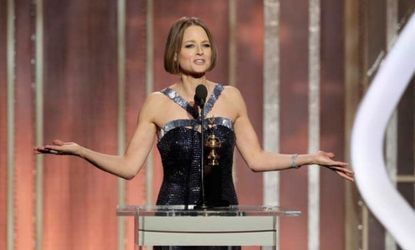The actress’ all-over-the-place speech, argues Eric Sasson at The Wall Street Journal, did a disservice to gay people who want to know they’re not alone.

(Image credit: Paul Drinkwater/NBCUniversal via Getty Images)
During Sunday’s Golden Globes, the acclaimed actress and director Jodie Foster was honored with the Cecil B. DeMille award for her lifetime of cinematic achievement. But instead of taking the opportunity to reflect on her 47 years in the business, or offering advice for the next generation of actors, Foster delivered a “confrontational, defensive, disjointed” non-coming-out-coming-out speech, says Eric Sasson at The Wall Street Journal. After a lengthy build-up that suggested she was about to publicly come out as gay, the two-time Oscar winner said, “I’m just going to put it out there, right, loud and proud… I am, uh, single.”
“It was a joke,” Sasson says, “but it wasn’t a laughing matter.” As an actress who has spent her entire life in Hollywood’s scrutinizing spotlight, it’s understandable that Foster would “see her sexuality as the one thing she would not share with a world that was asking everything else of her.” But by using the speech as an attack on the meddling media, the actress did a disservice to the public, particularly gay people who want to “know that we are not only not alone but that we could be proud of ourselves.” Sasson continues:
I’m pretty sure that when someone famous comes out publicly that they aren’t automatically forgoing their right to privacy. Wasn’t it possible, for instance, for someone like Foster to have said, fifteen years ago, “I’m gay. And just like straight people, gay people value their privacy. Now leave me alone.” How about ten years ago? Or even five years ago? It’s pretty apparent that it took those famous people who did come out early — at a time when it wasn’t convenient for their careers, when there was the real risk of backlash or ridicule, or worse, discrimination or violence — to force the issue of gay rights into the spotlight, and make people question their beliefs. These people who were courageous and stood up, who showed people around the world that gay people were everywhere, that we were in Hollywood and in professional sports, that we were in politics and academia and in all high-profile professions, these people allowed teenagers like me who felt isolated, disconnected, afraid of their feelings to know that we were not only not alone but that we could be proud of ourselves. We might have to face scorn or backlash, but one day we could be who are, without shame.
